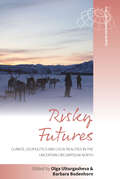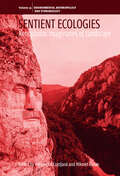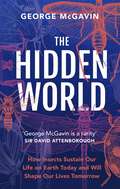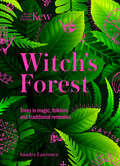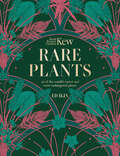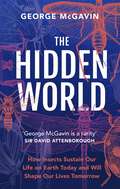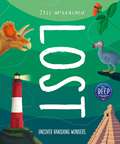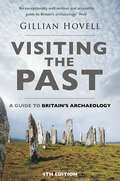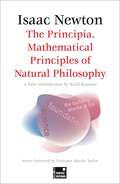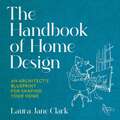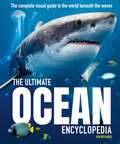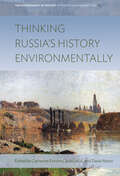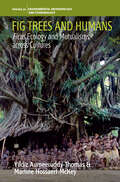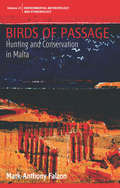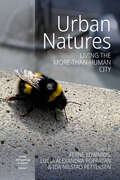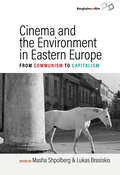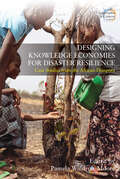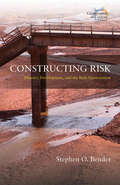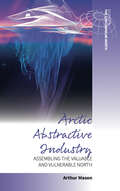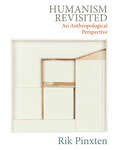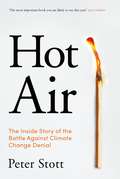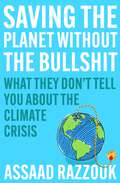- Table View
- List View
Risky Futures: Climate, Geopolitics and Local Realities in the Uncertain Circumpolar North (Studies in the Circumpolar North #6)
by Olga Ulturgasheva Barbara BodenhornThe volume examines complex intersections of environmental conditions, geopolitical tensions and local innovative reactions characterising ‘the Arctic’ in the early twenty-first century. What happens in the region (such as permafrost thaw or methane release) not only sweeps rapidly through local ecosystems but also has profound global implications. Bringing together a unique combination of authors who are local practitioners, indigenous scholars and international researchers, the book provides nuanced views of the social consequences of climate change and environmental risks across human and non-human realms.
Sentient Ecologies: Xenophobic Imaginaries of Landscape (Environmental Anthropology and Ethnobiology #31)
by Alexandra Coțofană and Hikmet KuranEmploying methodological perspectives from the fields of political geography, environmental studies, anthropology, and their cognate disciplines, this volume explores alternative logics of sentient landscapes as racist, xenophobic, and right-wing. While the field of sentient landscapes has gained critical attention, the literature rarely seems to question the intentionality of sentient landscapes, which are often romanticized as pure, good, and just, and perceived as protectors of those who are powerless, indigenous, and colonized. The book takes a new stance on sentient landscapes with the intention of dispelling the denial of “coevalness” represented by their scholarly romanticization.
The Hidden World: How Insects Sustain Life on Earth Today and Will Shape Our Lives Tomorrow
by George McGavinInsects conquered the Earth long before we did and will remain here long after we're gone.They outnumber us in the billions and are essential to many of the natural processes that keep us alive and that we take for granted.Yet, despite this, very few of us know much about the hidden world of insects.In this fascinating new book, entomologist and broadcaster George McGavin takes a deep dive to reveal the unknown truths about the most successful and enduring animal group the world has ever seen, and to show the unseen effects this vast population has on our planet, if only we care to look.McGavin explores not only the incredible traits that insects have evolved to possess, such as dragonflies that can fly across oceans without resting or beetles that lay their eggs exclusively in corpses, but also the vital lessons we have learnt from them, including how therapy using maggots can save lives and how bees can help grow rich tomato yields.The Hidden World reveals the wonderful complexity of our relationship with insects, how they have changed the course of our history and how, if we continue to learn from them, they could even be the key to our future and survival.
Kew - Witch's Forest: Trees in magic, folklore and traditional remedies
by Royal Botanic Kew Sandra LawrenceThere is more folklore, mythology and magic associated with our trees and forests than with any other living things.Known throughout the world as dark and wild places where witches make mischief and eerie creatures dwell, forests are also places of sanctuary for the ancient magic and the most enchanting species of trees.Kew: Witch's Forest is a beautifully illustrated, captivating journey through the magical woodland and its stories, from birch broomsticks and the sacred olive, to alder doorways and the Tree of Life.
Kew - Witch's Forest: Trees in magic, folklore and traditional remedies
by Royal Botanic Kew Sandra LawrenceThere is more folklore, mythology and magic associated with our trees and forests than with any other living things.Known throughout the world as dark and wild places where witches make mischief and eerie creatures dwell, forests are also places of sanctuary for the ancient magic and the most enchanting species of trees.Kew: Witch's Forest is a beautifully illustrated, captivating journey through the magical woodland and its stories, from birch broomsticks and the sacred olive, to alder doorways and the Tree of Life.
Kew - Rare Plants: The world's unusual and endangered plants
by Ed Ikin Royal Botanic Kew"Some plants are inherently rare, while others become rare through our actions."Rare Plants explores what makes the world's most uncommon plants so exceptional, and by what means they have become so scarce. From highlands to jungles, many of our most extraordinary plants are vanishing at shocking rates, and this exquisitely illustrated book explores 40 of these mysterious species.Featuring stunning archive images and expert insight from the Royal Botanical Gardens, Kew, Rare Plants explores both the beauty and necessity of our endangered plant life.
Kew - Rare Plants: The world's unusual and endangered plants
by Ed Ikin Royal Botanic Kew"Some plants are inherently rare, while others become rare through our actions."Rare Plants explores what makes the world's most uncommon plants so exceptional, and by what means they have become so scarce. From highlands to jungles, many of our most extraordinary plants are vanishing at shocking rates, and this exquisitely illustrated book explores 40 of these mysterious species.Featuring stunning archive images and expert insight from the Royal Botanical Gardens, Kew, Rare Plants explores both the beauty and necessity of our endangered plant life.
The Hidden World: How Insects Sustain Life on Earth Today and Will Shape Our Lives Tomorrow
by George McGavinInsects conquered the Earth long before we did and will remain here long after we’re gone.They outnumber us in the billions and are essential to many of the natural processes that keep us alive and that we take for granted.Yet, despite this, very few of us know much about the hidden world of insects.In this fascinating new book, entomologist and broadcaster George McGavin takes a deep dive to reveal the unknown truths about the most successful and enduring animal group the world has ever seen, and to show the unseen effects this vast population has on our planet, if only we care to look.McGavin explores not only the incredible traits that insects have evolved to possess, such as dragonflies that can fly across oceans without resting or beetles that lay their eggs exclusively in corpses, but also the vital lessons we have learnt from them, including how therapy using maggots can save lives and how bees can help grow rich tomato yields. The Hidden World reveals the wonderful complexity of our relationship with insects, how they have changed the course of our history and how, if we continue to learn from them, they could even be the key to our future and survival.
The Hidden World: How Insects Sustain Life on Earth Today and Will Shape Our Lives Tomorrow
by George McGavinInsects conquered the Earth long before we did and will remain here long after we’re gone.They outnumber us in the billions and are essential to many of the natural processes that keep us alive and that we take for granted.Yet, despite this, very few of us know much about the hidden world of insects.In this fascinating new book, entomologist and broadcaster George McGavin takes a deep dive to reveal the unknown truths about the most successful and enduring animal group the world has ever seen, and to show the unseen effects this vast population has on our planet, if only we care to look.McGavin explores not only the incredible traits that insects have evolved to possess, such as dragonflies that can fly across oceans without resting or beetles that lay their eggs exclusively in corpses, but also the vital lessons we have learnt from them, including how therapy using maggots can save lives and how bees can help grow rich tomato yields. The Hidden World reveals the wonderful complexity of our relationship with insects, how they have changed the course of our history and how, if we continue to learn from them, they could even be the key to our future and survival.
Lost: Discover disappearing wonders
by Jess McGeachinA book that explores what it means to be lost, in all sorts of ways. The story of our world is one of constant change. At times it's been slow, as animals evolved and continents drifted apart. But it's also been rapid - like the giant asteroid that ended the reign of the dinosaurs. Lost asks readers what it means to be here and gone on our tiny planet. They'll find lost cities like Machu Picchu and Pompeii, meet amazing megafauna that once roamed the earth and learn about contemporary species under threat. They'll discover that sometimes being lost the safest place to be - just ask the cleverly camouflaged animals hiding in plain sight.
Visiting the Past: A Guide to Britain's Archaeology
by Gillian HovellArchaeology isn’t just for academics and television presenters – it’s for everyone. And it is all around us. Get your boots on and explore Britain’s national and local archaeology sites for yourself with this revised and updated, easy-to-read, fully illustrated guide.Follow our islands’ history in this step-by-step introduction. Discover what life was like from the earliest days of human habitation right through to the world wars. Then get out to visit the best sites and see what features each era left behind for us to find – and find out how to spot archaeology for yourself in the most surprising places.Be warned: you may never look at an empty field, a stone monument or an old building in the same way again!
The Principia. Mathematical Principles of Natural Philosophy (Foundations)
by Sir Isaac Newton Professor Marika TaylorNewton's bold masterwork helped shaped the cultural landscape of the world today. Now in a digestible, pocket format for the modern reader.New concise edition with a new introduction, abridged for the modern reader. The Principia. Mathematical Principles of Natural Philosophy is one of the most important scientific works ever to have been written and has had a profound impact on modern science. Consisting of three separate books, the Principia states Newton&’s laws of motion and Newton&’s law of universal gravitation. Understanding and acceptance of these theories was not immediate, however by the end of the seventeenth century no one could deny that Newton had far exceeded all previous works and revolutionised scientific thinking.The FLAME TREE Foundations series features core publications which together have shaped the cultural landscape of the modern world, with cutting-edge research distilled into pocket guides designed to be both accessible and informative.
The Handbook of Home Design: An Architect’s Blueprint for Shaping your Home
by Laura Jane ClarkArchitectural solutions & designs to optimize the spaces in your home without spending a fortune.Architect Laura Jane Clark, from the BBC and Netflix smash-hit series Your Home Made Perfect, has spent over 15 years designing, remodelling, and building homes with budgets that range from modest to enormous. THE HANDBOOK OF HOME DESIGN distils Laura's wealth of experience and enthusiasm giving you an accessible yet detailed guide to design, empowering you with the tools and knowledge to shape your home how you want. Throughout your home design journey, whether large or small, Laura takes you each step of the way from understanding your home, reading a plan and writing a brief, right through to sketching your own design and having the confidence to get what you want on the building site. Packed full of tips and tricks, inspiration and technical know-how, THE HANDBOOK OF HOME DESIGN is like having Laura by your side, showing you how to design practical yet beautiful spaces, get more storage into your life and create the home of your dreams.Laura Jane Clark wants to democratize the whole concept of residential architectural design and empower you to redesign your spaces by giving you the language and ability to confidently communicate your vision, get the most out of your design and ultimately love your finished home. Whether you are a long-term homeowner, first-time buyer or simply visualising your dream space, no matter what your budget is, this unique insight into Laura's process allows you to achieve both the design you want and the home you need.www.lamparchitects.co.uk Instagram: @laurajaneclark_(p) 2023 Octopus Publishing Group
The Ultimate Ocean Encyclopedia: The complete visual guide to ocean life (Ultimate Encyclopedia #3)
by Jon RichardsThis new and unique encyclopedia is an amazing new visual guide to the planet's seas and oceans. Using amazing photography and cutting edge CG images, readers can explore every aspect of our oceans, from the submarines that explore them to the vast array of life that lives in them.Discover the plants and animals that exist in every ocean habitat, from the shore to the lowest trenches. You'll learn about sealife including crustaceans, coral, anenomes, every kind of fish, as well as mammals like sealions, dolphins and orcas, and ocean giants like the Blue Whale.Readers will also be able to see how humans have lived with the ocean for millennia, and how our actions today can doom or save our amazing oceans in the years ahead. This brand new encyclopedia is packed with stunning images that truly bring the wonder and majesty of the world's oceans to life.
Thinking Russia's History Environmentally (Environment in History: International Perspectives #25)
by Catherine Evtuhov, Julia Lajus, and David MoonHistorians of Russia were relative latecomers to the field of environmental history. Yet, in the past decade, the exploration of Russian environmental history has burgeoned. Thinking Russia’s History Environmentally showcases collaboration amongst an international set of scholars who focus on the contribution that the study of Russian environments makes to the global environmental field. Through discerning analysis of natural resources, the environment as a factor in historical processes such as industrialization, and more recent human-animal interactions, this volume challenges stereotypes of Russian history and in so doing, highlights the unexpected importance of Russian environments across a time frame well beyond the ecological catastrophes of the Soviet period.
Fig Trees and Humans: Ficus Ecology and Mutualisms across Cultures (Environmental Anthropology and Ethnobiology #32)
by Yildiz Aumeeruddy-Thomas Martine Hossaert-McKeyHumans and figs form hybrid communities within the context of anthropogenic landscapes, supported by biocultural mutualisms driven by traits of Ficus species and people’s imagination and practices, and where humans also positively influence Ficus species ecology. Fig Trees and Humans examines the interactions between the biology and ecology of the genus Ficus and how humans use and think of Ficus species across the tropics and in the Mediterranean region. It demonstrates a high level of convergence of material and symbolic uses of human-fig interactions that affect various aspects of human culture, as well as the ecology of wild or cultivated Ficus species.
Birds of Passage: Hunting and Conservation in Malta (Environmental Anthropology and Ethnobiology #25)
by Mark-Anthony FalzonBird migration between Europe and Africa is a fraught journey, particularly in the Mediterranean, where migratory birds are shot and trapped in large numbers. In Malta, thousands of hunters share a shrinking countryside. They also rub shoulders with a strong bird-protection and conservation lobby. Drawing on years of ethnographic fieldwork, this book traces the complex interactions between hunters, birds and the landscapes they inhabit, as well as the dynamics and politics of bird conservation. Birds of Passage looks at the practice and meaning of hunting in a specific context, and raises broader questions about human-wildlife interactions and the uncertain outcomes of conservation.
Urban Natures: Living the More-than-Human City (Urban Anthropology Unbound #1)
by Ferne Edwards, Lucia Alexandra Popartan Ida Nilstad PettersenEfforts to create greener urban spaces have historically taken many forms, often disorganized and undisciplined. Recently, however, the push towards greener cities has evolved into a more cohesive movement. Drawing from multidisciplinary case studies, Urban Natures examines the possibilities of an ethical lively multi-species city with the understanding that humanity’s relationship to nature is politically constructed. Covering a wide range of sectors, cities, and urban spaces, as well as topics ranging from edible cities to issues of power, and more-than-human methodologies, this volume pushes our imagination of a green urban future.
Cinema and the Environment in Eastern Europe: From Communism to Capitalism
by Masha Shpolberg and Lukas BrasiskisThe annexation of Eastern Europe to the Soviet sphere after World War II dramatically reshaped popular understandings of the natural environment. With an eco-critical approach, Cinema and the Environment in Eastern Europe breaks new ground in documenting how filmmakers increasingly saw cinema as a tool to critique the social and environmental damage of large-scale projects from socialist regimes and newly forming capitalist presences. New and established scholars with backgrounds across Europe, the United States, and Australia come together to reflect on how the cultural sphere has, and can still, play a role in redefining our relationship to nature.
Designing Knowledge Economies for Disaster Resilience: Case Studies from the African Diaspora (Catastrophes in Context #7)
by Pamela Waldron-MooreDisaster research has been studied from many angles, seldom targeting its implications for vulnerable territories in Africa. Entities most subject to the effects of climate change are often undeveloped and located in disadvantaged regions. Post-disaster communities need to scrutinize the social, political, economic, and cultural structures that stagnate sustainable growth. Acknowledging that low economic development and high climate costs cannot coexist, this collected volume interrogates the challenge for disaster-prone territories to determine strategies for restructuring and redesigning their environment. This book proposes the creation of knowledge economies, whereby empowered communities may produce innovative knowledge translatable across the African diaspora.
Constructing Risk: Disaster, Development, and the Built Environment (Catastrophes in Context #4)
by Stephen O. BenderReviewing current policies and practices, the book assesses the financial, economic and physical risk of building in hazardous areas, and looks at how societies approach economic development while trying to create a more resilient built environment in spite of the dangers. It examines the vulnerability of economic and social infrastructure to natural hazard events, looks at policies which imperil infrastructure, and proposes new development approaches to be undertaken by sovereign states, international development banks, NGOs, and bilateral aid agencies.
Arctic Abstractive Industry: Assembling the Valuable and Vulnerable North (Studies in the Circumpolar North #5)
by Arthur MasonThrough diverse engagements with natural resource extraction and ecological vulnerability in the contemporary Arctic, contributors to this volume apprehend Arctic resource regimes through the concept of abstraction. Abstraction refers to the creation of new material substances and cultural values by detaching parts from existing substances and values. The abstractive process differs from the activity of extractive industries by its focus on the conceptual resources that conceal processes of exploitation associated with extraction. The study of abstraction can thus help us attune to the formal operations that make appropriations of value possible while disclosing the politics of extraction and of its representation.
Humanism Revisited: An Anthropological Perspective
by Rik PinxtenThe West emancipated itself from the old humanism long ago and in doing so distanced itself from ‘heteronomy’: it declared that man, and not a non-human power, should be the first reference to approach people and nature. Today, as heirs of this tradition, we are still stuck in Eurocentrism (and often racism), and now even threaten to ruin nature by destroying biodiversity and causing the climate to warm up dangerously. Applied through an anthropological perspective, this book calls for a NEED-humanism: Not-Eurocentric, Ecological and (economically) Durable approach that can help promote inclusion and pluralism.
Hot Air: The Inside Story of the Battle Against Climate Change Denial
by Peter StottThe shocking inside story of the fight to halt climate change over the past twenty-five years by a world-renowned scientist.Ours is the age of global warming. Rising sea levels, extreme weather, forest fires. Dire warnings are everywhere, so why has it taken so long for the crisis to be recognised?Here, for the first time, climate scientist Peter Stott reveals the bitter fight to get international recognition for what, among scientists, has been known for decades: human activity causes climate change. Across continents and against the efforts of sceptical governments, prominent climate change deniers and shadowy lobbyists, Hot Air is the urgent story of how the science was developed, how it has been repeatedly sabotaged and why humanity hasn't a second to spare in the fight to halt climate change.
Saving the Planet Without the Bullshit: What They Don't Tell You About the Climate Crisis
by Assaad RazzoukHave you heard that you should go vegan to save the planet? Or carbon offset your flight to mitigate its effects? Or invest in an ethical pension plan? What if you were told that such actions make little difference at all? In Saving the Planet Without the Bullshit, Assaad argues that for too long green activism has been unfocused and distracted, trying to go in too many directions, focussing on individual behaviour. But all these things, are dwarfed by the one big thing that simply has to happen, very soon: namely, massively curtailing the activities of the hydrocarbon and petrochemicals industry. Full of counter-intuitive statistics and positive suggestions for individual and collective action, this ingenious book will profoundly change how you view the climate crisis.
